F L A U N T


This year in Venice, villains were on and off the screen, both physical beings and ideologies that should be done away with in our big, bright, beautiful world.
It certainly was a brilliant casting coup to employ one of the hottest young actors working today to play the most well-known monstrous creature in cinema. But Mexican filmmaker Guillermo del Toro is known for his inspired casting talent, as well as for his eccentric filmmaking. So, when it was announced in early 2024 that Jacob Elordi would be replacing Andrew Garfield—who, along with Oscar Isaac as Victor Frankenstein and Mia Goth as Elizabeth Lavenza, had been attached to the project since 2023—it was no surprise that the Australian actor would be at the center of this extraordinary story of love, power, and good intentions gone awry.
Elordi has played a multitude of heroes and antiheroes in welcomed shades of grey. The Australian actor starred as high school football player Nate Jacobs in Sam Levinson’s HBO series Euphoria, also starring Zendaya and Eric Dane, a character the actor has called a “narcissist” and a “sociopath.” Elordi then moved on to play another imperfect hero, this time, drug-addicted music legend Elvis Presley in Sofia Coppola’s 2023 film Priscilla, based on Priscilla Presley’s memoirs of her time with the King. In Frankenstein, a film based on the 1818 Gothic novel by Mary Shelley (and one which comes from a long cinematic tradition of monsters who make audiences fall in love with them) the Creature is not necessarily the demon here, as Isaac’s Victor himself is an arrogant hothead with a god complex. Sound familiar? Politics were never far away from the festival this year—have politics ever been that distant from entertainment, anyway?

Another monster looming large on the Lido turned out to be Mount Vesuvius, the active (though presently quiescent) volcano which overlooks the Italian city of Naples and its beautiful bay. In his latest scripted documentary Below the Clouds, Italian award-winning filmmaker Gianfranco Rosi depicted a city living on the edge and proved prophetic. Just days after the black and white, at times funny, lavishly shot and mostly studious film premiered in Venice, the Campi Flegrei area near Naples suffered another earthquake. The area is depicted at length in the film through various calls to emergency services by concerned citizens, whenever a seismic shock is felt. Sometimes monsters may be sleeping but it doesn’t take much to wake them.
Rosi’s film went on to win the Special Jury Prize in Venice, awarded by jury president, American filmmaker Alexander Payne, who was joined on the Competition jury by Iranian helmer Mohammad Rasoulof, American director and photographer RaMell Ross and award-winning Brazilian actress Fernanda Torres, among others.
“I filmed and lived for three years on the horizon of Vesuvius,” Gianfranco Rosi stated, “searching for traces of history, the passage of time, what remains of everyday life. I collect stories in the voices of those who speak, I observe the clouds, the smoke of the Campi Flegrei. When I film, I embrace the surprise of an encounter, of a place, the life of a situation… I shot in black and white, I watched in black and white. While filming, between the sea, the sky, and Vesuvius, I discovered a new archive of truth and possibility.”

While Paolo Sorrentino’s La Grazia, this year’s opening film in Venice, didn’t feature any apparent monsters, the film’s central theme stands for our human ability to combat the biggest fiend of them all: self assuredness. It reminded me of the famous Bertrand Russell quote: “The fundamental cause of the trouble is that in the modern world the stupid are cocksure while the intelligent are full of doubt.” With his doubts, the outgoing fictional Italian President Mariano De Santis, portrayed brilliantly by Sorrentino’s frequent collaborator Toni Servillo, delves deep into the human condition and finds the answers to some of the questions posed by his power, through thoughtfulness and experience.
La Grazia, which will be released in cinemas in January 2026 distributed by MUBI, is an extraordinary film about wisdom, which is a virtue we seem to have forgotten about, obsessed as we are with immediacy and our “who-said-it-first” syndrome these days. La Grazia, which translates in English as “grace” but also “clemency,” turns out to be a film about the power of love. There are no sex scenes—not even a kiss in the film—just a hug heard but not seen, of a daughter for her accomplished father. With his nuanced and heart-conquering performance, Servillo deservedly won the top acting prize in Venice, the Coppa Volpi for Best Actor. During the Venice press conference for the film, Sorrentino admitted that the person of Mariano De Santis was inspired in part by the present Italian President Sergio Mattarella and that the story was born out of Mattarella’s 2019 decision to grant clemency to a man who had killed his Alzheimer-afflicted wife. "It immediately seemed like an interesting moral dilemma to tell," Sorrentino explained, "for years I've thought that moral dilemma was a formidable narrative engine, more than any other narrative tool usually used in cinema."

While on the subject of awards, the top prize this year in Venice went to Jim Jarmusch’s Father Mother Sister Brother, a triptych of shorts produced by Saint Laurent Productions. The Golden Lion winner features stunning performances by Tom Waits, Charlotte Rampling, Cate Blanchett, Adam Driver and American actor and model Luka Sabbat. Divided in three segments, named “Father,” “Mother” and “Sister Brother,” the film is deliciously Jarmusch, from beginning to end. Leaving almost all to the viewer’s imagination, the NY-based filmmaker is in top form, and manages a quiet masterpiece filled with easter eggs of fashion dos and don’ts, as well as portraits of cultures—from a very suburban New Jersey (which the filmmaker chose based on union fees) to Dublin, and ending up in Paris.
There isn’t a monster in sight in Father Mother Sister Brother, though in typical Jarmusch fashion it demonstrates people who aren’t exactly perfect. The film holds up a mirror to our own inability to view art possessing subtlety and quiet elegance. In his speech after winning the top prize Jarmusch said “I appreciate what Benny Safdie said about empathy—art does not have to address politics directly to be political, it can engender empathy and a connection between us which is really the first step towards solving the problems we have.” Safdie had just won Best Director for his latest film Smashing Machine, starring Dwayne Johnson as UFC figure Mark Kerr.

Politics were never far from the Lido, and some filmmakers tackled them head on. This was the case for French helmer Olivier Assayas and his latest film The Wizard of the Kremlin, starring Jude Law as Vladimir Putin—I bet the Russian leader is feeling good about that casting choice —and Paul Dano as spin doctor Vadim Baranov, a fictional character inspired by real-life Russian fixer, Vladislav Sourkov. Based on the 2022 debut novel by Giuliano da Empoli, the film was adapted for the big screen by Assayas, along with acclaimed author Emmanuel Carrère.
The filmmaker was unsure at first about turning the story into a film, “it felt too abstract, too dialogue-heavy; many elements that flow naturally in the novel,” he confessed. Eventually, Assayas was convinced by Carrère’s enthusiasm, “Emmanuel brought both deep family-rooted knowledge of Russian history and far deeper insight into contemporary Russia than I had,” he explained, “he speaks the language and has conducted field investigation into post-Soviet Russia. In short, I became convinced that The Wizard of the Kremlin offered everything necessary for a rich, ambitious film whose development would unfold over the long haul.”
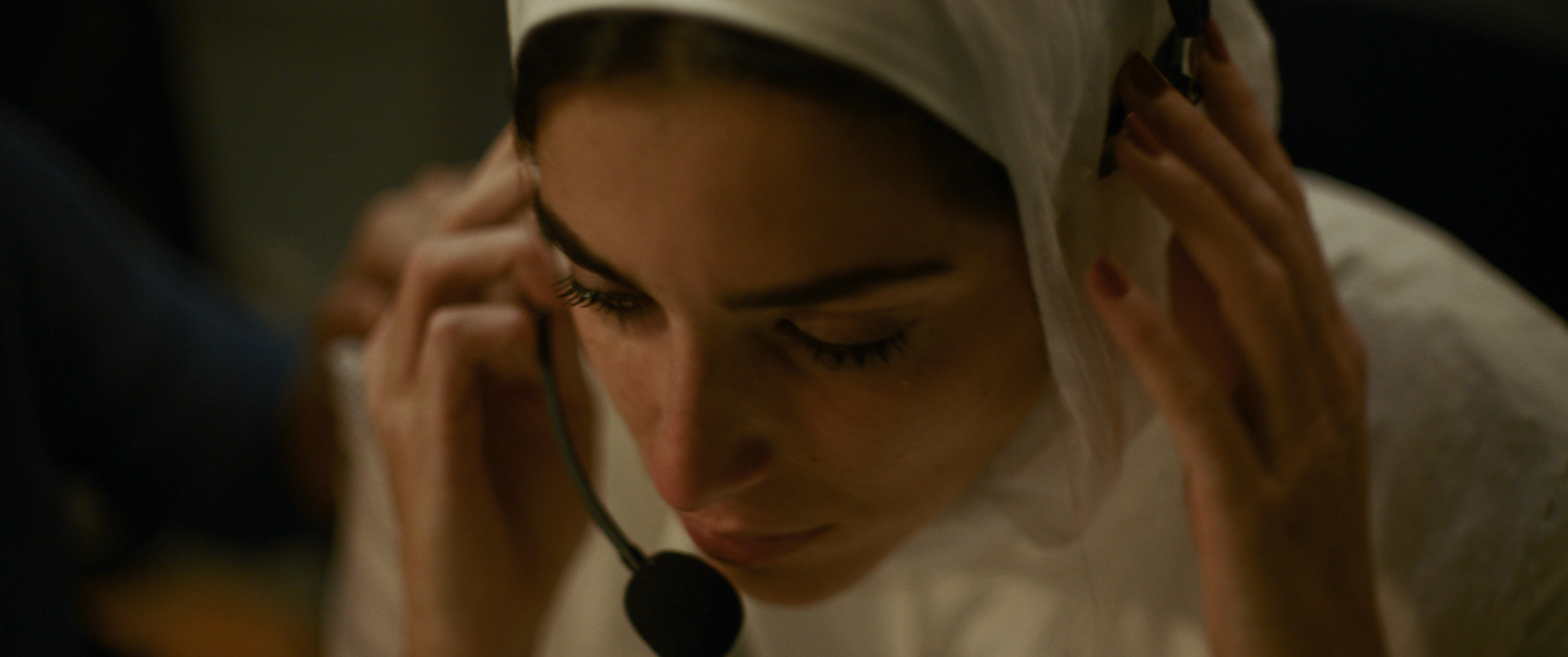
The genocide in Gaza was a demon looming over the story told by the Silver Lion winner this year, Tunisian Oscar-nominated filmmaker Kaouther Ben Hania’s The Voice of Hind Rajab. The film was welcomed by a 22+ minute standing ovation. Brad Pitt, Joaquin Phoenix and Rooney Mara, along with Alfonso Cuaron and Jonathan Glazer came onboard, shortly before the film’s premiere, as Executive Producers, to help the title in the awards race later on. This year, Venice woke up to the terrorizing policies of one megalomaniac leader who seems hellbent on wiping his neighbors off the map— Venice4Palestine demonstrations took place on the streets, on the red carpet and in writing throughout the festival.
In the film, Ben Hania utilizes the real 2024 phone call that five year old Hind Rajab made to emergency services as the car she was traveling in with her relatives, trying to flee Gaza City, was shot at by an Israeli army vehicle. When the original phone call between Hind, her cousin Layan Hamadeh and emergency personnel was released—in which Hind begs for help before being shot over 300 times by Israeli Defense Forces—Ben Hania admitted she felt a tug. “When I heard Hind Rajab’s voice asking for help, I felt she was asking me. I couldn’t stay silent,” she told an Italian radio station. Kicking off the film’s press conference in Venice, Jordanian actress Saja Kilani made a statement, that started out with “this film is not an opinion or a fantasy. It is anchored in truth. Hind’s story carries the weight of an entire people…”
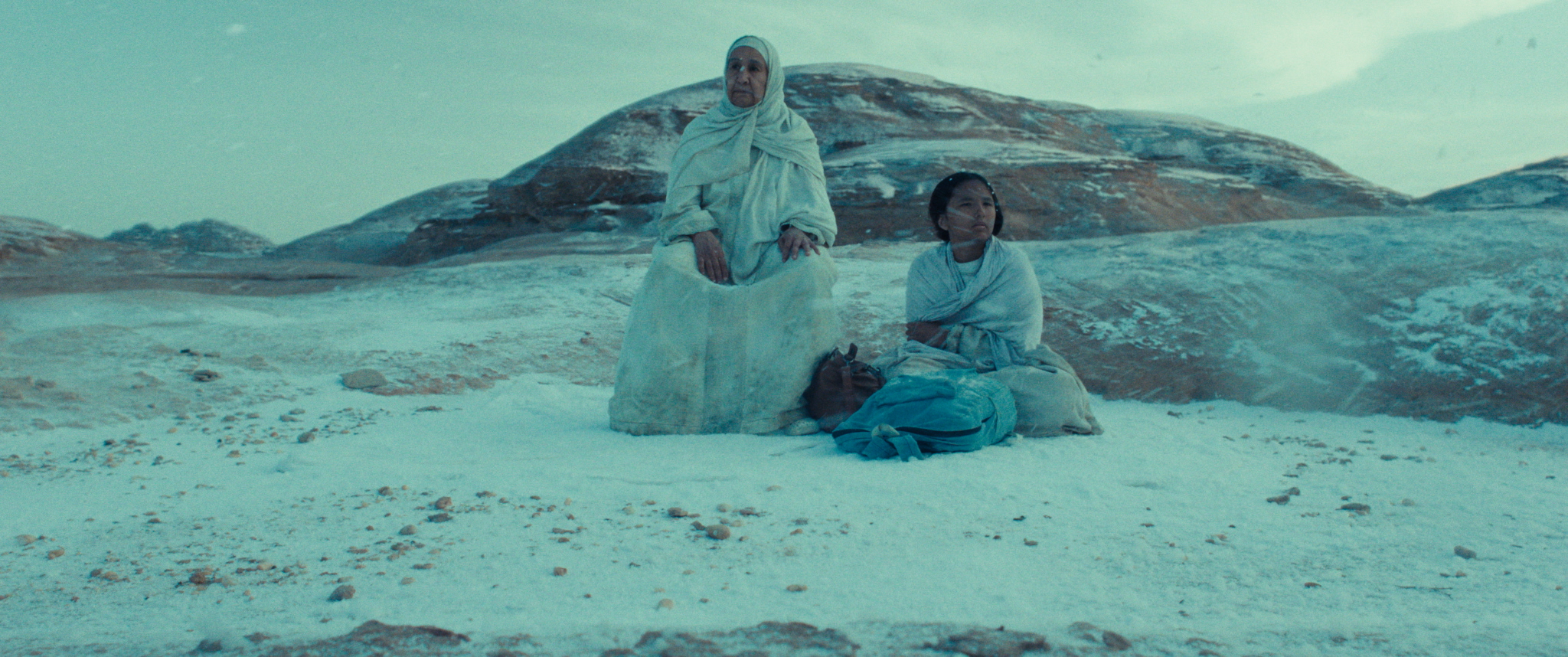
While on the subject of stories from the Middle East, two wonderful women-helmed projects premiered away from the main Competition in Venice. Saudi filmmaker Shahad Ameen’s Hijra screened in the new Venezia Spotlight section which substituted the Orizzonti Extra lineup from past editions. Films premiered there do compete for the Armani Beauty Audience Award, which this year went to the Moroccan film Calle Málaga directed by Maryam Touzani, proving that a film just needs an audience to find success, not the noise created by critics and film journalists, who view too much and care too little.
But back to Hijra, a special kind of road movie featuring unlikely protagonists and taking place on a spiritual path threaded by religious pilgrims in Saudi Arabia for centuries. Ameen, whose past work Scales also premiered in Venice in 2019, brings together in her contemporary story an elderly woman and her preteen granddaughter, as the duo search for the latter’s missing sister. The use of Saudi landscapes, which vary from foggy mountain tops to rocky tundras, in sunshine and snow and spread out all the way to rolling seas, proves the presence of another monster among us. Misinformation, as we often think of Saudi Arabia as just a land of sand and camels, where instead the country has so many diverse ecosystems and possesses at once a kind of lush beauty and impenetrable landscape.
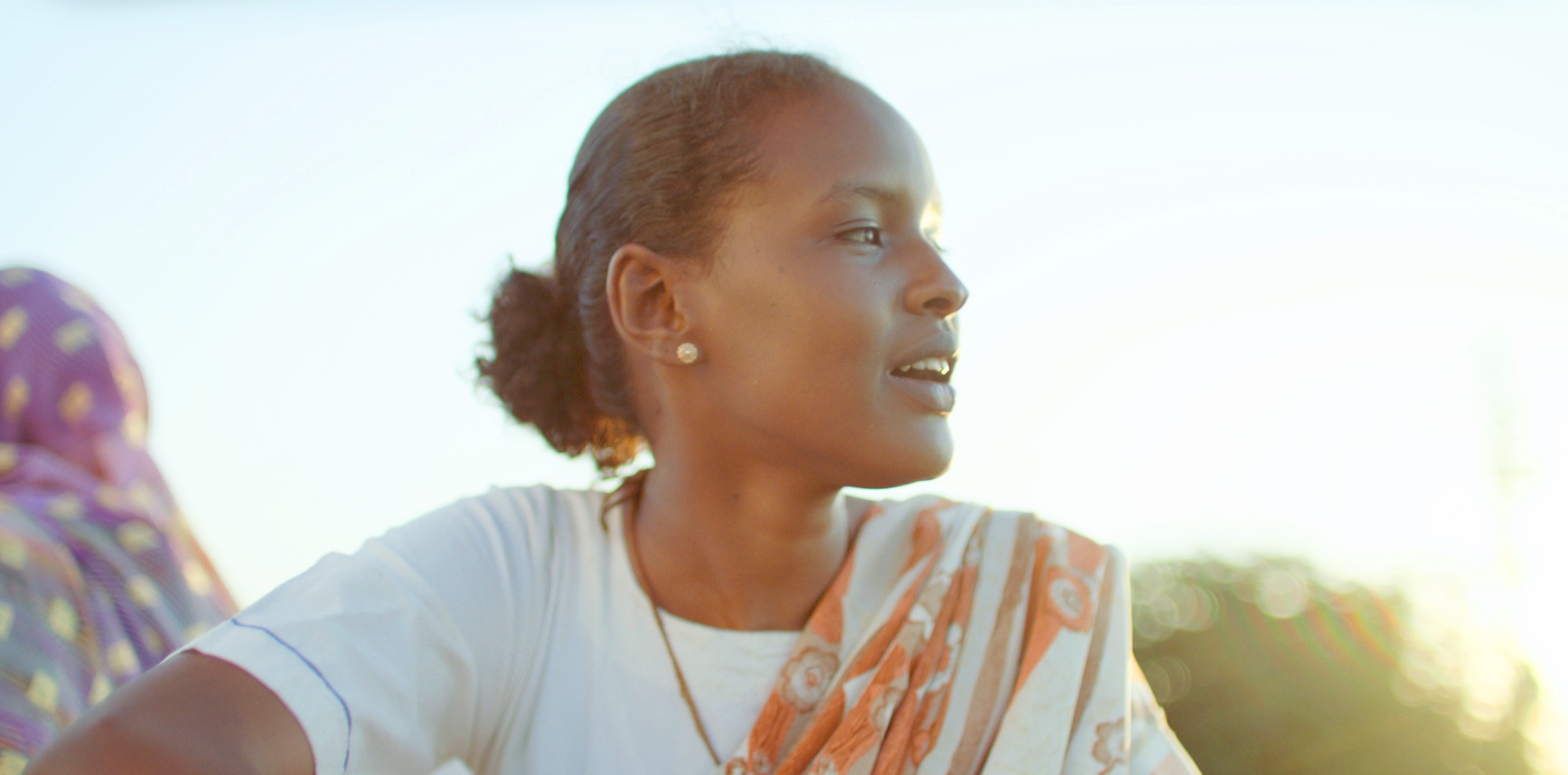
Another story from the MENA, this time hailing from Doha-based, Sudanese Russian filmmaker Suzannah Mirghani, is the stunning Cotton Queen, which premiered in the alternate section of Critics’ Week in Venice. A feature length, loose version of Mirghani’s earlier award-winning short Al Sit, the film also expands on the story of a girl and her grandmother, as in Hijra, but this time the two are at home, in their village in Sudan. There, cotton is the main source of work for the girls of the village, and the elder Al Sit (played by the phenomenal, non-professional actor Rabha Mohamed Mahmoud) serves as a kind of agent. But Al Sit’s own story is multi-layered and complex, as is the life of any woman in Sudan. The film, with its protagonist Nafisa (another extraordinary non-actor, the pretty, fresh faced Mihad Murtada) climbs to feminist heights as we discover she once was instrumental in stopping something wickedly cruel going on in the village, a given in Sudanese society. The film also ends on a grand climax, as the audience comes to realize that one lithe, single, young girl can conquer the monsters of colonialism left over from decades, centuries gone by. “We’re controlled by teenage girls,” says one villager at the start of the film, prophetically.
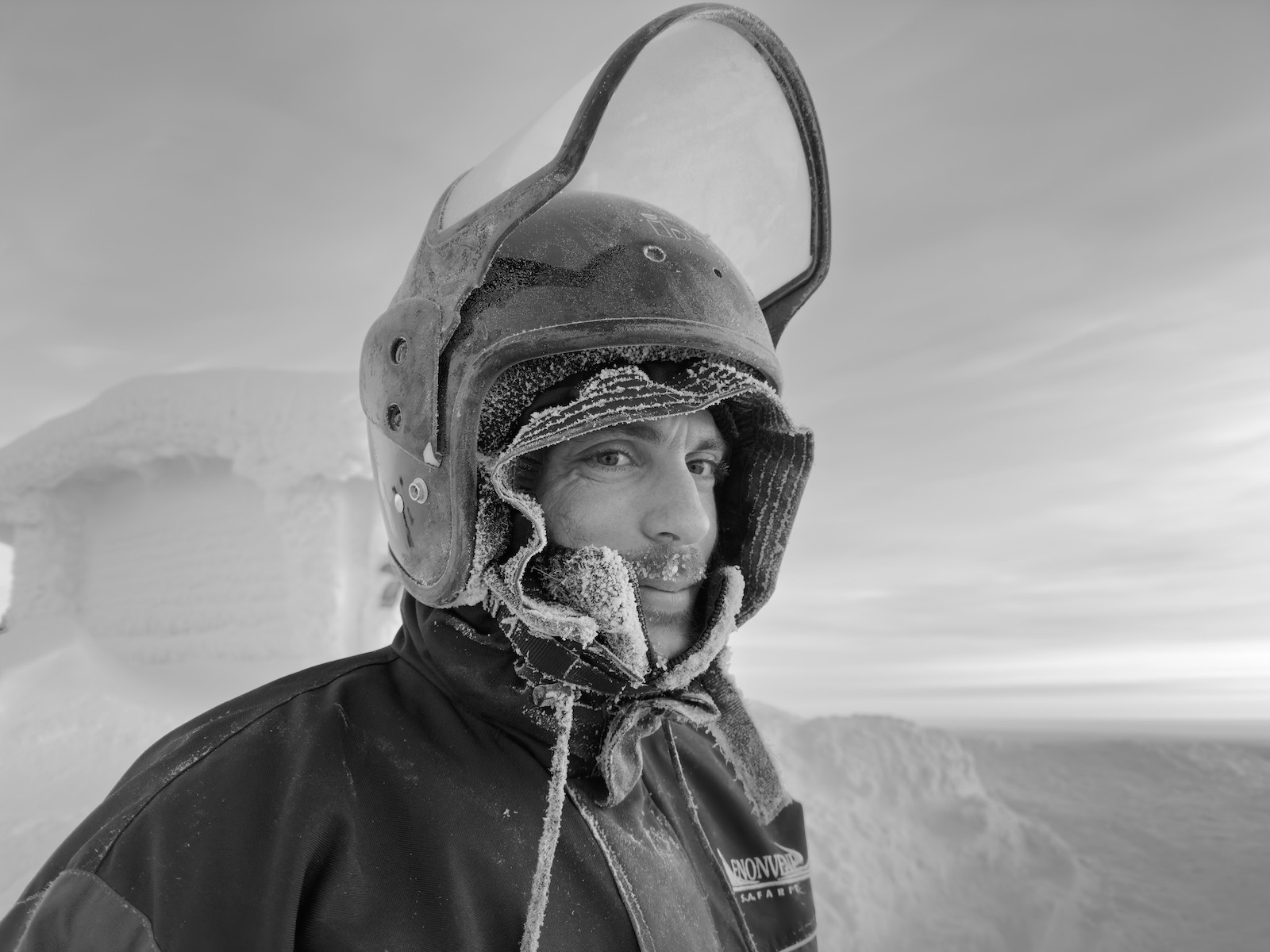
Giulio Bertelli’s AGON premiered at Critics Week. Bertelli, a professional offshore sailor, has a degree in architecture and just happens to be Miuccia Prada’s son. His feature debut proves that talent, no matter what it happens to be focused on, runs in the family as AGON—the ancient Greek word for competition/conflict used in various fields: sports, military, literary and legal, but also the root of the English word “agony”—is a gem of a film. The specter of failure in sport looms large over Bertelli’s stunningly shot and perfectly sound-designed film, while we watch three women athletes try to achieve victory at the fictitiously named Ludoj 2024 Olympics.
“The film really started from a conversation with a couple of friends,” Bertelli told me in Venice, “of just imagining who could be, and how it would be, [to take] the story of Joan of Arc, a medieval heroine from France, [if she was] a professional fencer and, in this geopolitical stage for countries [that are] Olympics today, she were to kill someone.” The result, and how Bertelli constructs the story, will change how I look at sports, and particularly women’s sports, forever.
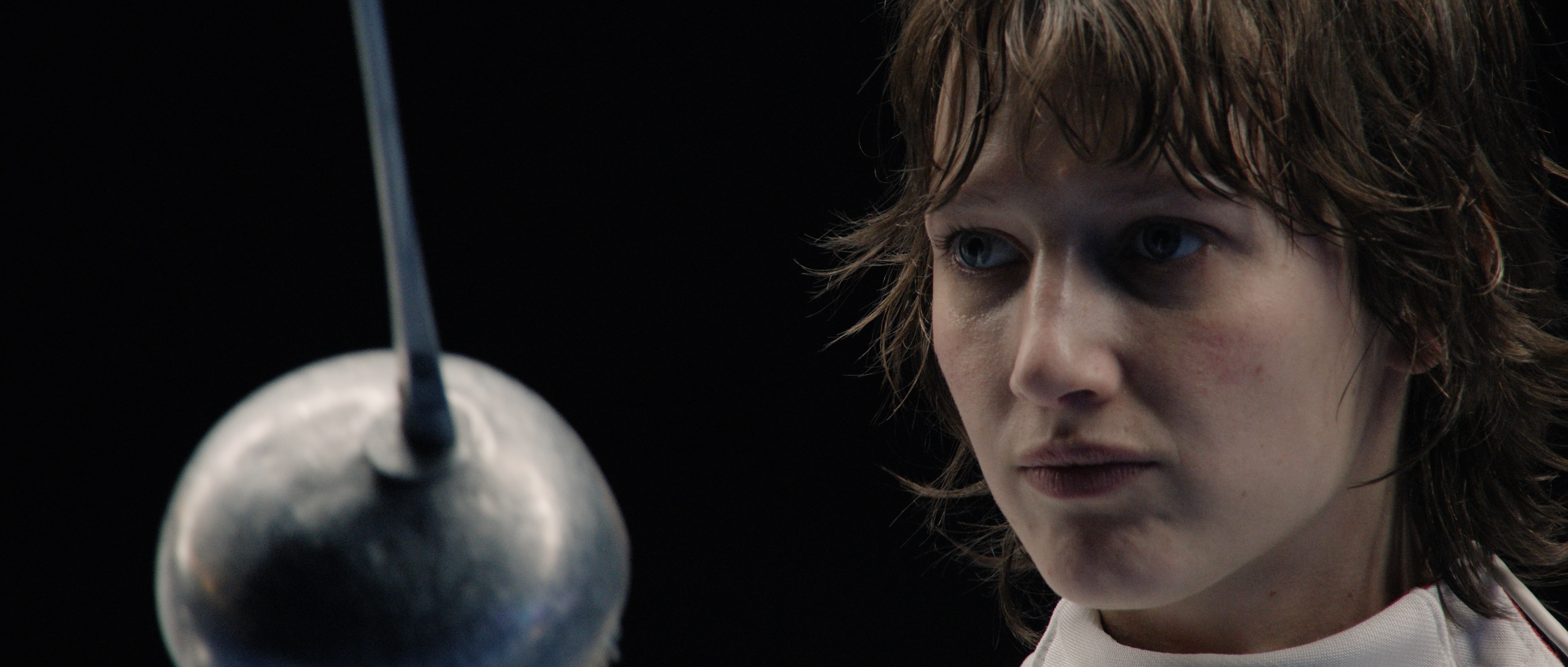
Last—but most definitely not least—is a documentary by filmmaking and artist couple Iain Forsyth & Jane Pollard, who have been responsible for some of the most creative non-fiction films around, since their BAFTA nominated 2014 title 20,000 Days on Earth about Nick Cave. This time around, with documentary Broken English, the two endeavor to retain memories of iconic figures with singer Marianne Faithfull. The woman is a wondrous music figure in her own right, with songs that range from her 1960’s super hit “As Tears Go By,” to the controversial “Sister Morphine,” through to her 2018 release Misunderstanding, which she — spoiler alert! — sings at the end of the film.

The monster in the film, in case you were wondering, is media bias, as most of the press snippets about Faithfull come from a very misogynistic era in journalism, (where many referred to Faithfull as Mick Jagger’s “ex-girlfriend”). When the narrative about a young woman with a powerful voice, in more ways than one, was not a positive one.
When I interviewed Pollard and Forsyth in Venice, I told them how I found their film a feminist anthem and discovered in Faithfull a personal feminist icon. Pollard grabbed her cheeks, in a silent scream and told me “She would have hated that!” proving that sometimes the biggest monster in the room belongs to our own selves simply trying to attach labels to personalities who cannot fit into any boxes, like the subject of Broken English and its filmmakers.
The 82nd Venice International Film Festival, La Biennale Cinema took place on the Lido from August 27th to September 6th, 2025.